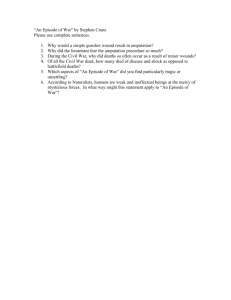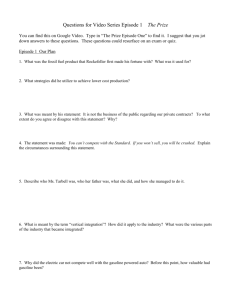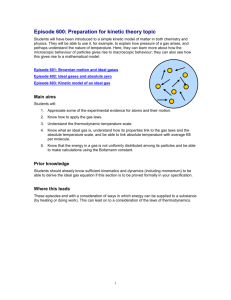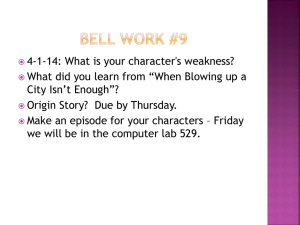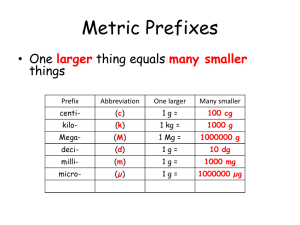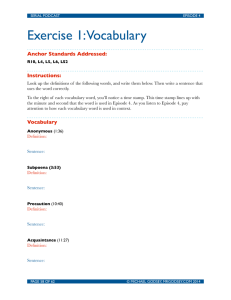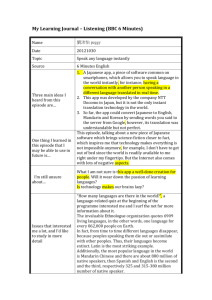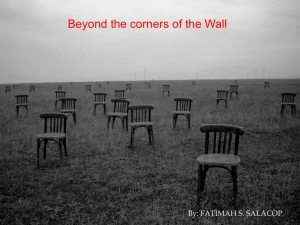how do you effectively implement the linguapod
advertisement
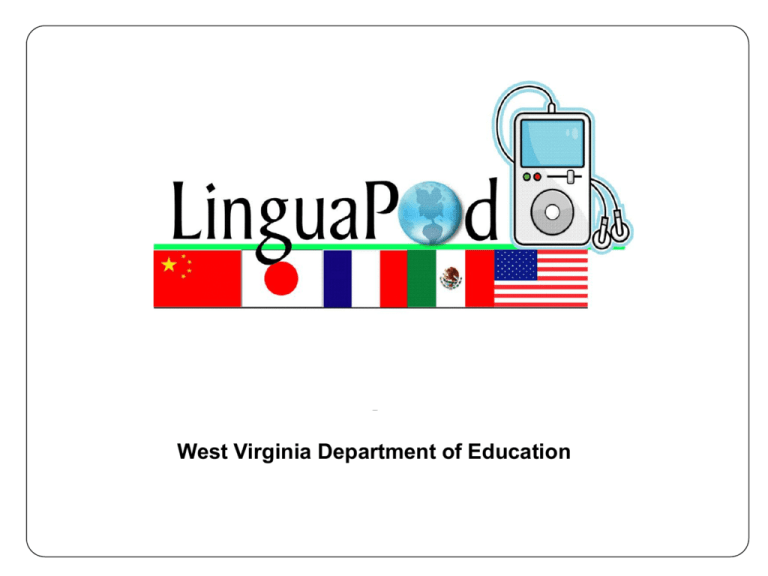
West Virginia Department of Education State Training June 11, 2009 Charleston, West Virginia Objectives for Training: • Develop an understanding of the WVDE LinguaPod Program • Develop an understanding of how to effectively implement the program in the classroom (lessons learned from pilot) • Develop an understanding of how to effectively train teachers to implement the LinguaPod program West Virginia Department of Education Agenda • Introductions and Program History • Overview of the LinguaPod Program: What is LinguaPod? • Episode 1 Program Demo • Effectively implementing in the Middle School Classroom • Lunch • Training Teachers • Closure West Virginia Department of Education Program History • 2005 -West Virginia Department of Education is awarded a three year SEA Foreign Language Assistance Program(FLAP) grant • Focus: Foreign Language expansion at the middle school level • Media-based program in the languages of Spanish, French, Japanese, Chinese. West Virginia Department of Education What is LinguaPod? • A digital media-based program designed to introduce language to an audience of middle school students • Produced in the languages of Chinese, French, Japanese and Spanish • Each language series consists of 10 contextualized episodes/pods that follow a similar story • Each episode is accompanied by a series of support curricular activities. West Virginia Department of Education What are the principles embedded in the LinguaPod episodes that support language learning? • The dialogue in each episode uses the target language exclusively. (Comprehensible Input) • Builds receptive and interpretive listening skills for native pronunciation of the target language. • Integrates cultural products, practices and perspectives. • Episodes are based in meaningful, communicative contexts that carry significance for middle school students. West Virginia Department of Education What are the Assessment pieces embedded within LinguaPod? • National Standards and WV CSO’s • Formative Assessment for Learning • Performance-based tasks and 21st Century Skills West Virginia Department of Education How can LinguaPod be accessed? • Individual episodes for the LinguaPod series will be downloadable via Mp3 & MP4 technology available through the program website. http://wvde.state.wv.us/linguapod/ • Episodes and extension learning activities are available to participating teachers via DVD format. West Virginia Department of Education LINGUAPOD PROGRAM DEMO: JAPANESE EPISODE 1 West Virginia Department of Education West Virginia Department of Education West Virginia Department of Education West Virginia Department of Education Day 1 Episode 1 “Welcome” Teacher-conducted pre-viewing activities (5 minutes) Play LinguaPod episode (7 minutes) Post-viewing discussion of the episode “What did you observe?” (5 minutes) Play LinguaPod episode again. (7 minutes) Additional classroom discussion if needed Follow-up activity #1: True/False Activity (5 minutes) Follow-up activity #2: Multiple Selection Card Activity (5 minutes) Students make flashcards for key vocabulary (10 minutes) Day 2 Teacher-conducted review (5 minutes) Play LinguaPod episode (7 minutes) Follow-up activity #3: Match the Oral Statement to the Picture (5 minutes) Follow-up activity #4: Dictated Labeling/Coloring/Dra wing (5 minutes) Follow-up activity #5: Vocabulary Sequencing (5 minutes) Contextualized listening flashcard activity (5 minutes) Day 3 Play LinguaPod episode * (7 minutes) Follow-up activity #6: TPRS Storytelling (5 minutes) Introduction to miniproject (5 minutes) Students work on contextualized miniprojects (remainder of class) West Virginia Department of Education Day 4 Contextualized listening flashcard activity (5 minutes) Play LinguaPod episode * (7 minutes) Small group sharing of mini-project (20 minutes) Self-assessment checklist (5 minutes) Teacher conducted unit closure (5 minutes) Pre-Viewing Discussion Questions: Post-Viewing Discussion Questions: • • • • • • What kind of supplies do you need on the first day of school? What kind of information do you need to know on the first day of school? Have you ever had to start over at a new school where you did not know anyone? How did you feel? What helped you to feel comfortable in your new school? How many classes do you have? Do you have a textbook for every class? • • • • • • In Episode One, who was the new student this year? What country was she from? Do you think it would be difficult to go to school in another country? Why? What kind of school supplies did the students need for school? Where did they keep their books? Was the exchange student familiar with school lockers? Do the students in the video take the same classes as you? What other things did you observe? West Virginia Department of Education West Virginia Department of Education LINGUAPOD PROGRAM DEMO: JAPANESE INTERPRETIVE ACTIVITIES West Virginia Department of Education West Virginia Department of Education What are the language task components for each episode? • Multiple Choice Card Activity: • Oral True/False Questions: • Match the Oral Statement to the Picture: • Dictated Coloring, Labeling or Drawing: • Vocabulary Sequencing: • TPRS Storytelling: The video teacher asks a question that has a choice response. As each option is offered a color or symbol appears underneath the choice. Students indicate their answer by holding up the color or symbol card that corresponds with the answer. (If a student feels comfortable, he/she might actually say the choice in addition to holding up the card. Students should be encouraged to develop any sort of production skills at their own individual pace, if at all.) The video teacher asks a series of true or false statements related to material presented in each episode. Students mark true or false on their paper according to the statement. Students are given a series of pictures that relate to the episode. The video teacher states a number and reads a sentence that describes one of the pictures. The students place the number of the spoken statement in front of the corresponding picture Students are given a partially completed sheet of paper or a paper with black and white objects related to an episode. The video teacher orally directs the students to color an object a specific color, to label an object or to draw a specific item. The video teacher will tell a brief follow-up story or retelling of actions from the episode. Students have pictures of vocabulary words on their papers. Students number the pictures in the sequence that the vocabulary word is mentioned. The video teacher narrates a very brief follow-up story or retelling of actions from the episode. Students act out the short sequence using the gestures of the video student. The activity is repeated at least 2 -3 times with the video student. The brief story is then narrated by the video teacher and the students act out the story without the visuals West Virginia Department of Education Possible Review Questions • • • • • • • • What happened in the episode yesterday? Who were the main characters? Which character did you like the most in the episode? Why? What was the key issue/problem or topic of discussion in the episode? How is the main issue connected to your own life? Did you like the episode? Why or Why not? What advice would you give to any of the characters based upon the events featured in this episode? Pick one of the characters from the episode. Imagine that you are that character. Describe how you would have interacted with the situation and other characters in this episode? West Virginia Department of Education Episode 1 Mini-project Directions: In episode one, we are introduced to an exchange student from another country who has come to West Virginia to study. Going to a new country can be both an exciting and scary experience. In order to succeed you have to learn about all of the new customs and traditions associated with this new culture. Imagine that an exchange student came to your school. What kind of things would that individual need to know in order to succeed in school? For each episode of the LinguaPod series you are going to complete a related mini-project that will highlight some piece of culture. At the end of the final LinguaPod episode your collective mini-projects will be compiled together to make a guidebook that could be used by a foreign exchange student. Part 1 In episode one, the students experience the first day of a new school year. They get their books and lockers and make important introductions. An exchange student would need to know about the number of classes you take and the number of books you have for each subject. On the attached sheet you will find a graph with a column for a class and a column for # of textbooks. List your current classes in the left column. In the right column list the number of books that you need for each class. Part 2 In the United States middle school students often use lockers. This is a custom that may not be the same around the world. Do some research about schools in the country of the exchange student featured in Episode one. See if you can find out about the use of lockers for that country. What other information can you learn about the school? Try to find pictures of schools in that country. Be prepared to share your findings with the class. West Virginia Department of Education West Virginia Department of Education West Virginia Department of Education Possible Unit Closure Questions • • • • • • • • What important information was discussed in this episode that would be essential for an exchange student to know? What did you learn about the target culture form working with this episode? What would you still like to learn more about? What do you think is going to happen in the next episode? How does this episode compare with the other episodes of this series? What was the most important thing you learned from this episode? Do you feel that you were able to understand most of the language in the episode? Explain. What are some ways you can follow-up with what you learned in this episode? West Virginia Department of Education What are the program components for each episode? • • • • • Pre-viewing/Post viewing discussion questions: The classroom teacher will provide context and viewing guidance for students by using pre-viewing/post viewing discussion questions. Flashcards: Students make flashcards for key vocabulary. Cards consist of self-made drawings on the front and the phonetic pronunciation of the word/phrase listed with the target language word on the back. In addition to self-guided “practice”, the cards will be used in contextualized listening activities throughout each episode. Self-assessment checklist: At the end of each episode students will self-assess their ability to complete specific language tasks related to each episode. Contextualized formative mini-project: Students will complete a mini project at the end of each episode that relates to the main topic for that particular episode. The collective portfolio is an authentic assessment in itself, representing an orientation book for a potential visiting exchange student or LEP student that could attend the school. Review questions: General questions designed to activate student knowledge of the events that occur in each LinguaPod episode. A set of review discussion questions are provided to the instructor to use throughout the sequence of each episode and at the end of each unit. West Virginia Department of Education HOW DO YOU EFFECTIVELY IMPLEMENT THE LINGUAPOD PROGRAM? West Virginia Department of Education Scheduling Options 9 Week FLEX Facilitator Model Enrichment Course Model •Course Curriculum •6-10 episodes of a series •Facilitator/Language Proficient Teacher •Foreign Language Curriculum •All 10 episodes of a series •Facilitator • 6th Grade Students • 6th, 7th, or 8th Grade Students Outside Of Language Track 6 Week Instructional Resource Model 6 Week FLEX Facilitator Model •Foreign Language Curriculum •6-8 episodes of a series •Facilitator • 6th Grade Students •Instructional Resource •6-8 episodes of a series •Language Proficient Teacher •6th Grade Students 9 Week Instructional Resource Model •Instructional Resource •All 10 episodes of a series •Language Proficient Teacher •6th Grade Students West Virginia Department of Education Who makes the best classroom facilitator? • Instructors with Language Backgrounds – An individual who has studied other languages and cultures intensely in the past. • Instructors with Technology Backgrounds- An Individual who feels comfortable accessing content from video sources and facilitating instruction. • Instructors of Innovation- A talented and innovative individual who knows how to facilitate learning and actively engage students. West Virginia Department of Education Lessons Learned from the Pilot • Establishing Contextualized Language Learning with each LinguaPod Episode • Facilitating Interpretive Listening Activities • Accessing Cultural and Linguistic Resources/Moderator West Virginia Department of Education Establish Contextualized Language Learning • Adequately establish Context of the episode using the available resources (questions, personalization, real-world application, activity prompts). • Utilize Multiple Passes with a specific listening task in order to actively engage students in the story. • Seek/Create Contextualized Extension Opportunities to increase student learning outcomes. West Virginia Department of Education Facilitating Interpretive Listening Activities • Adequately Scaffold interpretive listening tasks by providing listeners with appropriate strategies. • Emphasize the Context of the activity. • Utilize Multiple Passes as needed in order to provide students with sufficient time to apply interpretive listening skills. • Review correct responses to interpretive listening tasks to emphasize the development of listening skills. West Virginia Department of Education Accessing Cultural and Linguistic Resources /Moderator • Identify a Native Speaker of the language in the regional area. • Create ongoing opportunities for students to Document their questions about the target language and culture. • Provide an opportunity for Language and Cultural Exchange. West Virginia Department of Education LINGUAPOD TRAINING VIDEO West Virginia Department of Education LinguaPod Episode Theme/Context 1: The Welcome Start of school 2: The Foreign Language Festival Planning for a competition 3: The Play Performing a play/production 4: The Surprise Party Planning for a party 5: The Photo Album Preparing a photo/memory album 6: Here’s My Schedule Comparing schedules 7: It’s Noon Discussing food 8: The Birthday Box Discussing clothing 9: Here’s My family Identifying family members 10: “Cousin” Phones Discussing activities West Virginia Department of Education NOW IT IS YOUR TURN TO TRY! West Virginia Department of Education Next Steps • Discuss the LinguaPod program with local administrators and teachers. • Make a request for program materials (copy of instructor's manual and DVD resources) using the online registration form. Please register by August 12, 2009 • WVDE will provide ongoing technical assistance throughout the fall and will be gathering program data. West Virginia Department of Education QUESTIONS? West Virginia Department of Education Contact for Additional Information: Robert Crawford Coordinator, World Languages Building 6, Room 318 Kanawha Boulevard, East Charleston, WV 25305-0330 (304) 558-2691 rcrawford@access.k12.wv.us West Virginia Department of Education
